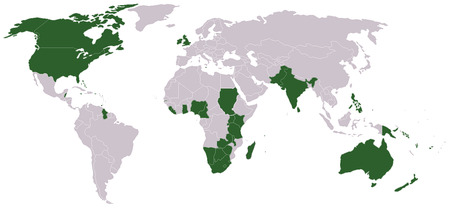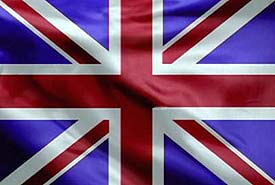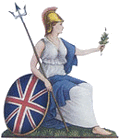English Language

Contents English Language How it Started Amazing Recovery And Onward Fragmenting English speaking countries
The English language is the nearest the world has seen to an 'international language'.
Approximately a third of the world can now communicate in English.
How it Started
From the 'Common Brittonic' languages evolved Old English (or Anglo-Saxon Englisc ). It was an early form of the English language that was spoken in parts of what are now England and southern Scotland from around 450 to 1250 AD. It is a West Germanic language and is closely related to 'Old Frisian'. In fact parts of coastal Netherlands around Terschelling have word sounds that are very close to present day English.
This period is Sandwiched between the occupation of the Romans up to around 400 AD and the French invasion of 1066.
Amazing Recovery

It is truly amazing that English as a language survived countless foreign invasions and '300 years' of French rule. But survive it did and even bloomed into a whole new vocabulary. Because of the influence of many invaders English has built itself on a basis of the early Brits and incorporating many other languages. From Latin, Germanic, French, Celtic and many more.
And Onward
English has official or special status in at least '75 countries' around the world. English is the primary international language in many fields including communications, science, business, aviation, entertainment, radio and diplomacy. Over two-thirds of the world's scientists read in English. Three quarters of the world's mail is written in English. Eighty per cent of the world's electronically stored information is in English.
This is due to the influence of the 'British Empire'. The biggest Empire in history has spread the language far beyond the British Isles.
Following World War II, the growing economic and cultural influence of the United States, the global interests in movies and Pop music from Britain and the USA all accelerated the spread of the language.
Fragmenting
As the language spreads it gets altered, for better or worse, as in the USA. American English has changed the spelling of some words so it is different to the rest of the world, but British English is the 'Official' English of international organisations like NATO, UN & WHO.It is calculated that on an average school day approximately one billion people are learning English in one form or another.
Less than a hundred years ago people from the north of England would struggle to communicate with people from the south of England, a matter of a hundred miles or so! Now speakers from opposite sides of the globe can communicate with each other.
English speaking countries
As a main language are shown in bold.
- Antigua
- Australia
- Bahamas
- Barbados
- Belize
- Bermuda
- Botswana
- Brunei (with Malay)
- Cameroon (with French)
- Canada (with French)
- Dominica
- Fiji
- Gambia
- Ghana
- Grenada
- Guyana
- India (with several Indian languages)
- Ireland (with Irish Gaelic)
- Jamaica
- Kenya (with Swahili)
- Kiribati
- Lesotho (with Sotho)
- Liberia
- Malawi (with Chewa)
- Malta (with Maltese)
- Mauritius
- Namibia (with Afrikaans)
- Nauru (with Nauruan)
- New Zealand
- Nigeria
- Pakistan (with Urdu)
- Papua New Guinea
- Philippines (with Tagalog)
- Puerto Rico (with Spanish)
- St Christopher and Nevis
- St Lucia
- St Vincent
- Senegal (with French)
- Seychelles (with French)
- Sierra Leone
- Singapore (with Malay, Mandarin and Tamil)
- South Africa (with Afrikaans, Xhosa and Zulu)
- Surinam (with Dutch)
- Swaziland (with Swazi)
- Tanzania (with Swahili)
- Tonga (with Tongan)
- Trinidad and Tobago
- Tuvalu
- Uganda
- United Kingdom and its dependences
- United States of America and its dependencies
- Vanatu (with French)
- Western Samoa (with Samoan)
- Zambia
- Zimbabwe


